[Review] Phoenix Wright: Ace Attorney: Dual Destinies
System: Nintendo 3DS
Release Date: October 24, 2013
Developer: Capcom
Publisher: Capcom
Author: Patrick
I’ve always had a soft spot for the Ace Attorney games. Their combination of legal drama, an exaggerated anime style and frequently hilarious dialogue resulted in some of the most memorable adventure games on the original DS. After passing the protagonist baton for a few entries, the original Ace Attorney —Phoenix Wright— returns to the courtroom with a fresh look and a few new faces. Unfortunately, I have a few objections to this new entry in the series. Phoenix might have retained his aptitude at bluffing his way through trials, but there’s a sense that the game’s writers have lost some of their ability to string together a cohesive story with interesting, well-developed characters.
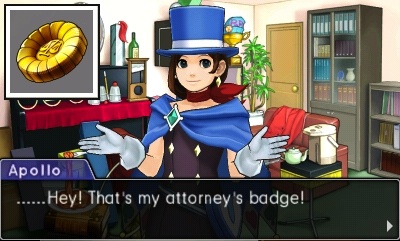
The game’s presentation has been vastly improved since the DS days. The characters and environments are now fully rendered in 3D, and it’s a noticeable improvement over the old spritework that fits well with the console’s stereoscopic 3D effect. Characters emote using detailed, exaggerated animations that perfectly capture the personality of the entire cast. Similarly, the character designs are as strong as ever; the quirky anime style won’t be for everyone, but they suit the ridiculous tone of the game. Once again, the soundtrack is provided by composer Noriyuki Iwadare who delivers a respectable repertoire of character themes. As per usual, the music for the dramatic courtroom battles eventually ramps up in intensity as your team of lawyers is closer to finding the truth, which is always satisfying. The improved sound quality that comes with switching to more modern hardware makes even the arrangements of older pieces sound fresh. However, the Ace Attorney games have always relied on strong writing rather than a flashy presentation, and this is where things start to fall apart.
Dual Destinies follows the same core structure as previous Ace Attorney games. Tasked with defending an innocent person charged with murder, your team of crazy-haired lawyers must put their heads together to investigate crime scenes and throw evidence around in ridiculous courtroom battles. The basic storylines don’t offer anything particularly innovative, but Dual Destinies does add a few new members to the core cast. Athena Cykes, a fresh-faced, eighteen-year-old lawyer joining Phoenix Wright’s legal office is possibly the best of the new characters. It’s wonderful to see the series introduce a well-developed female character who isn’t a disposable assistant or antagonist and Athena does a great job of injecting some humour into proceedings and driving the storyline in the latter half of the game. However, Athena is most interesting when she isn’t actually the playable character. The same applies to Phoenix and Apollo Justice; their personalities are diminished when the player is filling their shoes or they are assigned to playing the role of comic relief sidekick. As a result, the three lead characters feel somewhat interchangeable.
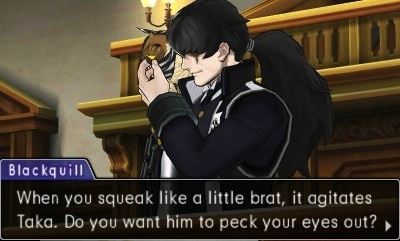
But appearing interchangeable is still preferable to being a flat-out bad character, such as Dual Destinies’ new prosecutor, Simon Blackquill. If Dual Destinies reads like someone’s Phoenix Wright fanfiction (and it often does), Blackquill would be their insufferable self-insert character. He’s a convicted criminal who is a total loner and also he’s a wannabe samurai with an oh so tragic back-story. Though he does have some entertaining moments thanks to his hawk buddy, Taka (translator’s note: Taka means “hawk”), his gimmick as a criminal samurai is played out and he mostly uses odd phrases to spit out unfunny one-liners. Ultimately he just doesn’t feel as threatening as previous prosecutors like Miles Edgeworth or Franciscka von Karma. Thankfully, not all of the other new characters are as insufferable as Blackquill, and there are plenty of fun witnesses who take the stand, albeit with far less screen time. A handful of characters from previous Ace Attorney games make return appearances, but their presence is disappointing. Pearl Fey, for instance, shows up for a few cases but she stills acts like an eight-year old, using the same cutesy mannerisms she had almost a decade ago. There’s no sense of character development for the returning characters and they’re all mere cameos that pander to fans by imitating their original incarnations.
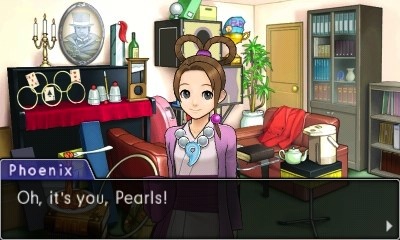
The game begins on a high note, with an introductory case that makes the traditionally tedious tutorials far more entertaining by throwing a courtroom bombing into the mix. Although the culprit is obvious and the mysteries behind the bombing are never fully resolved, the case does a excellent job of introducing the three lead characters and sets up plenty of plot hooks for the later half of the game. However, the following two cases just aren’t all that interesting and have little bearing on the overarching story. The second case takes place in a remote Japanese village (because of all the Japanese immigrants in LA, apparently) and introduces plenty of fun characters like the justice-crazed Detective Fulbright, but it doesn’t translate to English particularly well and the sealed-room mystery the case revolves around has too many plot holes and contrived situations, even by the series’ standards.
That said, it’s still far better than the insipid collection of anime clichés that make up the third case in the game. While traditionally the weakest part of an Ace Attorney game, Dual Destinies third part takes the series to new lows with an intelligence-insulting murder mystery set at a legal academy (read: Japanese high-school). If the annoying characters weren’t enough, this case also introduces the notion of a “dark age of the law” – that suddenly everyone involved with the current legal system is corrupt. Thematically, it’s not a bad idea, but it’s repeated so often that it feels like being bludgeoned over the head with a statue of The Thinker. Thankfully, the final two cases of the game are much stronger and provide some much needed character development for Apollo and Athena. That said, the fact that the two cases are connected mean that they drag on a bit too long. And the less said about the reveal of the main antagonist and the way everything is resolved, the better.
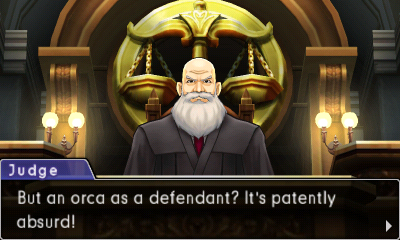
On the other hand, I was surprised how much I enjoyed the game’s single DLC case. It might be the most lighthearted murder yet, with musical numbers, r-EEL-y bad fish puns and an orca acting as defendant. It’s all very silly, but there’s more to the case than meets the eye and it even briefly gives Phoenix the moral quandary of potentially convicting an innocent person (or whale) of murder to have his client declared “not guilty”. I’m not surprised that this storyline was relegated to DLC since it doesn’t really fit in with the other cases, but despite its status as a “filler case”, the fact that it acts as a prequel to the rest of the game and can be played at any time prevents it from messing with the pacing.
Perhaps what I enjoyed most about the DLC case was the fact that no characters ever uttered the phrase “dark age of the law”. Again, exploring corruption in the legal system isn’t inherently a bad idea, but it’s a concept that has already been done to death in every other Ace Attorney game. Dual Destinies “dark age” is set into motion when someone was falsely charged with murder, an earth-shattering event that has only taken place in every case in the series. Despite the English version of the game taking place in Los Angeles, the series has always been quite critical of the Japanese judicial system, particularly in regard to corrupt officials. It’s great to see this continue in Dual Destinies, but it’s executed with little regard to previous entries in the series or any sense of subtlety. There’s no point pretending that corruption, false charges and forgery are sudden developments when Phoenix has already convicted about a dozen lawyers and members of the police and even used forged evidence himself (he also concealed evidence BY EATING A NECKLACE). It makes no sense to be complaining about the state of the legal system now and not, say, when someone was cross-examining a ghost.
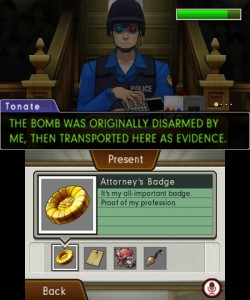
If anything, the dark age of the law should have already happened. The final case of Apollo Justice: Ace Attorney involved Phoenix seeking and eventually influencing legal reform, but Dual Destinies acts as if the events of the previous game never happened. I’m glad The Judge is back, but the implementation of the “Jurist System” in Apollo Justice was supposed to mirror Japan’s own recently-reintroduced jury trials and the game never explains why it was removed. In fact, plenty of important plot hooks from Apollo Justice are dropped completely, particularly in regard to Apollo and Trucy’s relationship. Perhaps director Takeshi Yamazaki didn’t want to continue the story that Shu Takumi introduced in Apollo Justice, but the result is an inconsistent plot that might match previous games thematically but seems to go out of the way to ignore their existence. This would fine if Dual Destinies was a stand-alone game —it’s best when it involves newcomer Athena’s “emotional” storyline— but as a sequel it feels lacking.
The dialogue, while by no means bad, felt like it lacked the wit of previous Ace Attorney entries. It’s unclear whether this is the fault of the original script or the localization (which, to its credit, is relatively free of the dated pop-culture references that plague the earlier entries in the series), but the game tends to take itself a bit too seriously at times. The script isn’t helped at all by the stiff voice acting in the anime cutscenes, though at least the voicework there is far better than the awful soundbites played when objecting or pressing witnesses. Phoenix’s old “objection!” is so iconic that any changes to it would sound wrong, but all of the voices feel unfitting, especially for characters from earlier games (such as a certain cravat-wearing prosecutor…).
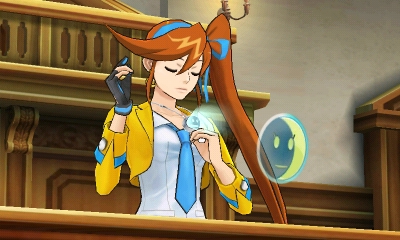
The general flow of coutroom proceedings is mixed up a bit in Dual Destinies through the introduction of the “Mood Matrix”, Athena’s crazy holographic device that can pick up changes in witnesses’ emotions. Functionally it’s not all that different from regular cross-examinations; Athena has to carefully analyse a piece of testimony and then select the out-of-place emotions or deduce the cause of any sudden mood swings. The device sometimes feels shoehorned into each case, but the way it radically changes the game’s presentation is really cool. The Mood Matrix might be a gimmick, but it’s handled far better than Phoenix’s magatama or Apollo’s magic wizard bracelet thing. Like in their own games, Phoenix and Apollo have their own means of detecting witnesses’ lies, but they appear so infrequently that they no longer feel like features. Giving each lawyer unique abilities should require you to utilize the talents of all three characters, but it feels like an afterthought that isn’t used to its full potential. Curiously, reaching an incorrect answer with the Mood Matrix or any other abilities no longer results in a penalty like presenting the wrong piece of evidence (not that those penalties made any narrative sense in the first place). Dual Destinies feels far less punishing and much more accessible as a result; having your client declared guilty now merely results in being thrown back to the previous testimony and you can even consult your partner for a hint on what evidence to present.
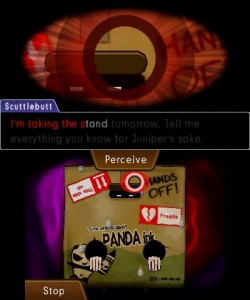
Perhaps I’m just too accustomed to the usual twists and turns of a typical Ace Attorney case, but there were very few moments in the game where I was struggling to determine what to investigate or what evidence to present. Some may see this combined with the lack of heavy penalties as the game and decry the game for being “too easy”, but I’m personally fine with it. I don’t want a narrative-driven game like Phoenix Wright to prevent progression and I hate it when adventure games punish players for failing to follow the designer’s specific logic. However, there is a sense that players are being nudged towards the correct answer and nowhere is this more apparent than the game’s more streamlined investigation sequences. Previously these sections essentially turned Ace Attorney into a “point and click” adventure game, but here Phoenix and co. are provided with a checklist of where to go and the actual investigation is limited to specific areas. Given the limited interaction in the visual novel genre, the Ace Attorney series has always had issues with creating a sense of player agency, but Dual Destinies only accentuates the problems with this approach. It felt like I was just being guided from one crime scene to the next and there was very little actual interaction with the environment or evidence. It’s true that there were times in previous games where the investigation sequences dragged on for too long, but by removing any sense of freedom Dual Destinies cut out the only parts that made them interesting.
Still, Dual Destinies’ courtroom showdowns are a lot of fun, even with the underwhelming Prosecutor Blackquill as an antagonist. The basic satisfaction that comes with finding contradictions in witnesses’ statements and watching their elaborate breakdowns is still very much present. Though it doesn’t always come across thanks to the narrative constantly switching perspectives, the group dynamic between Phoenix, Apollo and Athena is quite well done. Their different personalities and backgrounds even causes distrust between the three characters in the later parts of the game, and these result in the most interesting and dramatic moments. The problem is that these moments are few and far between and the overall storyline presented by Dual Destinies is one of the weakest in the series. It’s subjective, but for a game about analysing emotions, it felt awfully devoid of any.
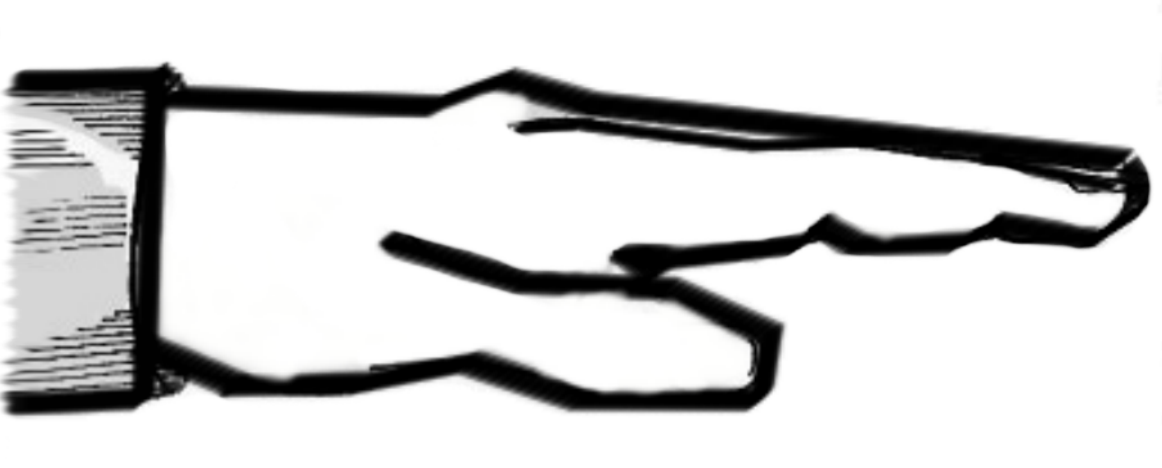
If you’re a die-hard Ace Attorney fan you’ll probably still get plenty of enjoyment out of Dual Destinies, but these new cases just don’t stack up to Phoenix’s original adventures. As a whole, the experience is much more consistent than Apollo Justice: Ace Attorney or Phoenix Wright: Justice for All, but there’s very little that stands out as being of exceptional quality or leaves any sort of emotional impact. If you’ve never touched the series before there are far better places to start.
